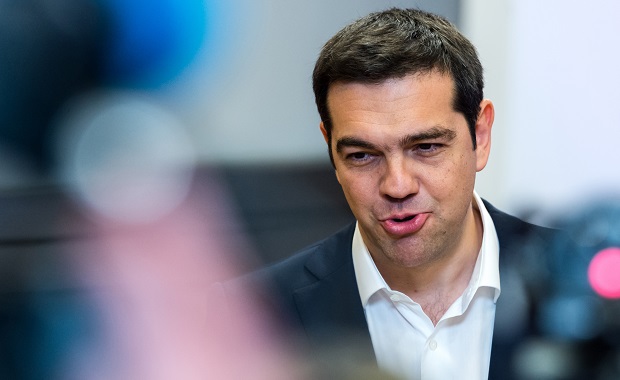Europe cautiously optimistic of Greek debt deal this week

Greek Prime Minister Alexis Tsipras speaks during a media conference at an EU summit in Brussels on Monday, June 22, 2015. Eurozone finance ministers were cautiously optimistic on Monday that a deal on Greece’s bailout was finally within reach this week, amid fears the country might otherwise default on its debts and fall out of the euro. AP
BRUSSELS, Belgium — Greece has finally offered economic reforms that creditors consider closer to being acceptable, giving Prime Minister Alexis Tsipras a few days to turn a spirit of goodwill into a deal that might keep the country from a painful exit from the euro currency and roil international markets.
Even though a firm deal between Greece and its lenders to get Athens more loans remained elusive at an emergency summit Monday, leaders from the 19 euro nations and the International Monetary Fund said Tsipras’ new reform plan offered the basis to break a four-month deadlock in talks.
BACKSTORY: Greece says ready to compromise, calls for Merkel decision
“We are advancing toward an agreement,” said French President Francois Hollande. But the gap separating what Greece wants to yield in painful reforms and what creditors are demanding before providing more funds remained sizable.
“We are closer than we ever were before,” said European Commission President Jean-Claude Juncker.
International Monetary Fund Managing Director Christine Lagarde said that despite the improvements in the Greek offer “it still lacks specificity. And it is still short of everything that we expected.”
Uncertainty over Greece has sapped confidence in global markets, particularly in Europe, and threatened the financial future of Greeks.
READ: Clock ticking on Greece to repay IMF
“I want to end this political gambling,” European Union President Donald Tusk told reporters in Brussels.
In the Greek government’s compromise proposal, Tsipras is offering about 8 billion euros ($9 billion) in higher taxes and austerity measures over the next two years — several of which go against his election commitments — as he sought a belated compromise with Greece’s creditors.
“The ball is in the court of the European leadership,” Tsipras said late Monday.
Tusk said Greece’s plans “were the first real proposals in many weeks.” Jeroen Dijsselbloem, the Dutchman who chaired an emergency meeting of eurozone finance ministers ahead of the summit, said “it’s an opportunity to get that deal this week.”
Greece needs the money urgently as it faces a June 30 debt repayment it cannot afford.
Leaders are now looking at a two-day European Union summit starting on Thursday in Brussels to make the final thrust in the talks and reach a deal that will keep Greece solvent. Finance ministers will meet again on the eve of the summit.
Multiple deadlines for Greece to propose more reforms have come and gone, with the country living hand to mouth in the meantime. But Hollande said it was “better to take a few days, but get to an agreement.”
German Chancellor Angela Merkel agreed, saying “there are still a lot of days left to come to a decision.”
The more cooperative spirit gave a boost to stock markets. Athens shares closed 9 percent higher. The Stoxx 50 index of top European shares was somewhat less volatile and closed up 4.1 percent.
The need for a deal could not be more pressing. Greece must pay 1.6 billion euros ($1.8 billion) to the IMF in just over a week. Further payments are due in July and August.
A debt default by Greece could destabilize its banks — Greeks are already withdrawing increasingly large amounts of money — and could in a worst case scenario cause the country to have to leave the euro.
That would be hugely painful for Greeks but experts are more divided about its effects on Europe and the world economy. Several European countries have said publicly they are getting prepared for the possibility.
Greece’s proposal for additional taxes on businesses, basic goods and middle-income households was aimed at easing pressure from lenders to slash pensions and wages after six years of recession but was expected to dash hopes of a financial recovery this year.
Athens will make tougher rules on early retirement and shift some categories of goods to a higher sales tax bracket, including hotels and certain foods. Emergency bailout taxes that had been imposed will remain, even though Tsipras had pledged to phase them out.
A Greek government official said that employers will have to contribute higher social security contributions to pension and unemployment funds. He said there would also be a special one-off tax for profitable businesses.
Beyond the pressure from within the eurozone, the United States also did its part. Treasury Secretary Jacob Lew spoke by phone with Lagarde and highlighted the need for all sides to come to a rapid agreement.
Despite the more upbeat mood in markets, tension was palpable in Greece, where people have flocked to cash machines to withdraw money.
“Everyone’s going (to the banks) to take money,” said Yannis Nikolopoulos in Athens. “If the banks shut it’ll be a problem to go shopping and that sort of thing.” Without a deal, he said, “we’re doomed.”
To support Greek banks in the face of growing money withdrawals, the European Central Bank increased the amount of emergency credit it allows the banks to draw on, officials said.
Reports indicate Greeks withdrew about 4 billion euros last week.
The current talks center on releasing the last 7.2 billion euros in the country’s bailout program, which expires at the end of the month.